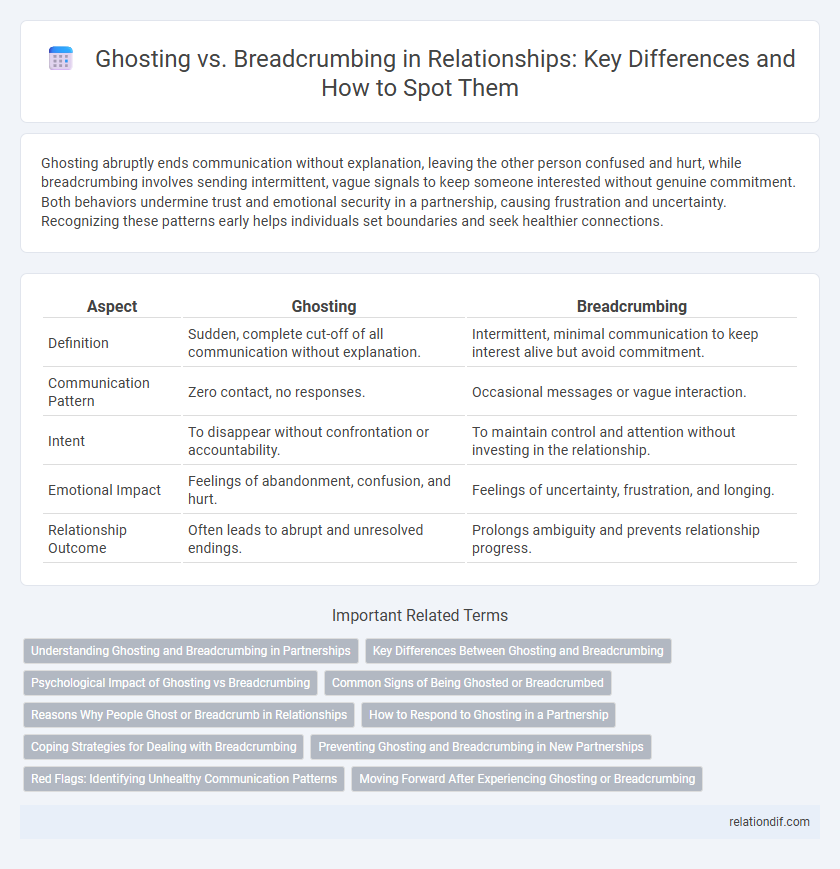Ghosting abruptly ends communication without explanation, leaving the other person confused and hurt, while breadcrumbing involves sending intermittent, vague signals to keep someone interested without genuine commitment. Both behaviors undermine trust and emotional security in a partnership, causing frustration and uncertainty. Recognizing these patterns early helps individuals set boundaries and seek healthier connections.
Table of Comparison
| Aspect | Ghosting | Breadcrumbing |
|---|---|---|
| Definition | Sudden, complete cut-off of all communication without explanation. | Intermittent, minimal communication to keep interest alive but avoid commitment. |
| Communication Pattern | Zero contact, no responses. | Occasional messages or vague interaction. |
| Intent | To disappear without confrontation or accountability. | To maintain control and attention without investing in the relationship. |
| Emotional Impact | Feelings of abandonment, confusion, and hurt. | Feelings of uncertainty, frustration, and longing. |
| Relationship Outcome | Often leads to abrupt and unresolved endings. | Prolongs ambiguity and prevents relationship progress. |
Understanding Ghosting and Breadcrumbing in Partnerships
Ghosting in partnerships occurs when one partner suddenly cuts off all communication without explanation, leaving the other person confused and emotionally unsettled. Breadcrumbing involves sending sporadic, non-committal messages that create false hope and prevent closure in the relationship. Recognizing these behaviors is essential for maintaining healthy boundaries and emotional well-being in romantic connections.
Key Differences Between Ghosting and Breadcrumbing
Ghosting involves abruptly cutting off all communication without explanation, creating sudden emotional distance and confusion. Breadcrumbing, however, consists of sending intermittent, vague messages to keep someone's interest without committing, causing prolonged uncertainty and mixed signals. The key difference lies in ghosting's total disengagement versus breadcrumbing's manipulative partial engagement.
Psychological Impact of Ghosting vs Breadcrumbing
Ghosting often leads to feelings of rejection, confusion, and lowered self-esteem due to sudden and unexplained silence, causing significant emotional distress and difficulty in closure. Breadcrumbing creates ongoing uncertainty and anxiety by delivering inconsistent attention, which can erode trust and prolong emotional vulnerability. Both behaviors negatively affect mental health, but ghosting's abruptness typically results in more acute psychological trauma, while breadcrumbing fosters chronic emotional instability.
Common Signs of Being Ghosted or Breadcrumbed
Common signs of being ghosted include sudden disappearance of communication without explanation, unanswered messages, and lack of social media interaction. Breadcrumbing is characterized by sporadic, non-committal messages that create false hope, minimal effort in conversations, and inconsistent plans to meet. Recognizing these behaviors early can help individuals protect their emotional well-being in a partnership.
Reasons Why People Ghost or Breadcrumb in Relationships
People ghost or breadcrumb in relationships due to emotional avoidance, fear of confrontation, or lack of genuine interest in commitment. Ghosting often stems from a desire to quickly end contact without explanation to escape discomfort, while breadcrumbing typically involves maintaining minimal communication to keep options open or boost self-esteem. These behaviors reflect underlying insecurities and communication challenges that hinder healthy relationship development.
How to Respond to Ghosting in a Partnership
Responding to ghosting in a partnership requires clear communication and setting boundaries to protect emotional well-being. It's crucial to seek closure by directly asking for an explanation while recognizing the importance of self-respect and moving forward if responses remain absent. Prioritizing self-care and support from friends or professionals can aid in healing and fostering healthier future relationships.
Coping Strategies for Dealing with Breadcrumbing
Coping strategies for dealing with breadcrumbing include setting clear communication boundaries and managing expectations by recognizing inconsistent interaction patterns. Prioritizing self-care and emotional well-being through mindfulness techniques and support networks helps mitigate the stress caused by ambiguous signals. Seeking clarity through direct conversations can empower individuals to make informed decisions about continuing or ending the relationship.
Preventing Ghosting and Breadcrumbing in New Partnerships
Establishing clear communication boundaries and expectations early in a new partnership significantly reduces the risk of ghosting and breadcrumbing behaviors. Regularly checking in with partners about their feelings and intentions fosters transparency and trust, discouraging avoidance or inconsistent contact. Prioritizing mutual respect and emotional availability sets a strong foundation, making manipulative patterns less likely to occur.
Red Flags: Identifying Unhealthy Communication Patterns
Ghosting and breadcrumbing are key red flags in partnerships indicating unhealthy communication patterns; ghosting involves abruptly cutting off all contact without explanation, while breadcrumbing refers to sending intermittent, non-committal messages to maintain minimal connection. Recognizing these behaviors helps individuals avoid emotional manipulation and maintain self-respect by setting clear boundaries. Consistent, transparent communication is essential to fostering trust and stability in any healthy relationship.
Moving Forward After Experiencing Ghosting or Breadcrumbing
Moving forward after experiencing ghosting or breadcrumbing requires clear self-awareness and setting firm boundaries to protect emotional well-being. Prioritizing open communication and seeking relationships with trustworthy partners can help rebuild trust and foster healthy connections. Engaging in self-care activities and, if necessary, professional counseling supports healing and personal growth beyond past negative experiences.
Ghosting vs Breadcrumbing Infographic

 relationdif.com
relationdif.com